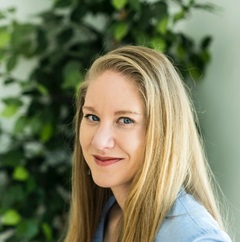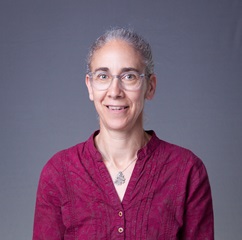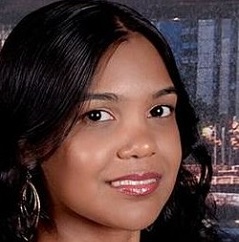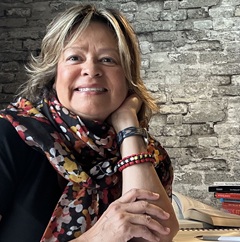Overview
In-person 4-Day/3-Night Retreat
Bringing truth and fact to the page has never been more important.
If you have an idea or draft of a nonfiction project and need a little support to move your work ahead, this retreat is for you. Join nonfiction and informational fiction writers: Miranda Paul, Heather Montgomery, and their guests including Nathalie Alonso and Andrea Page for a deep dive into the exciting world of nonfiction books.
You’ll enjoy presentations, guided outdoor experiences, small group discussions of your work, and so much more. In addition to the support from your faculty and fellow creatives, you’ll have ample time to work. We recommend bringing several projects at various parts of the drafting and revision processes.
- This is an in-person retreat for creatives interested in Science, Nature, Biography, and other nonfiction subjects.
- Small group discussions will help move along your project towards a finished state.
- Lodging and meals are included.
- No submission required.
- Begins at 5:30pm Eastern on Wednesday, August 13, 2025
- Ends after lunch on Saturday, August 16, 2025
The faculty could not have been better. Each member was talented and made me feel wonderful about my work.
Creek studies,
Research,
Writing proposals,
Questions needed for nonfiction inquiry,
and more!
Connections
- Working Retreat Time
- Roundtable Discussion Groups
- 1:1 Consultations
- Q&As about craft and publishing
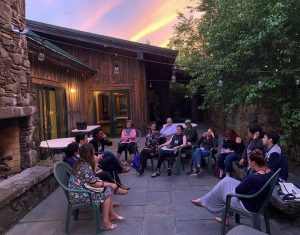
I feel ready to finish my book.
Why This Retreat?
Perhaps you have a background in geology? Or you’ve always loved the spiny orb-weaver?
Maybe you are a zoo dentist? Or live near the peaks of Manitou Springs?
The best nonfiction books come from the passion of the writer. If you have a topic burning to research and tell, this might be the retreat for you.
Join nonfiction and informational fiction writers: Miranda Paul, Heather Montgomery and guests including Nathalie Alonso and Andrea Page for a deep dive into the exciting world of nonfiction books.
You’ll enjoy presentations, guided outdoor experiences, small group discussions of your work, and so much more. In addition to the support from your faculty and fellow creatives, you’ll have ample time to work. We recommend bringing several projects at various parts of the drafting and revision processes.
Feedback Expected
- Each author and/or illustrator will meet with a faculty mentor for a consultation of their stories. Consultations will include time to discuss where you are in your stories, and ideas for moving forward with drafting, revisions, and/or submissions. No written feedback will be provided.
- You’ll receive feedback from faculty and fellow storytellers about your story, during round table group discussions of your work-in-progress.
- There will be informal feedback opportunities and time to share work during generative creative exercises, and as you connect with fellow attendees.
It’s a Great Fit If…
- You love nonfiction and are eager to write TRUE stories. This workshop provides a comprehensive introduction to the world of nonfiction children’s books.
- You are working on a nature or science-themed book for kids or teens. Study with our nature-loving faculty and let them help you craft an engaging book for kids.
- You are working on a biography for kids or teens. Our faculty is well-versed in researching and writing about people. They’ll help you find out how to make your biography the best it can be.
- You enjoy discussing stories with fellow nonfiction enthusiasts. Bring your up-to-date manuscript to be read aloud during our facilitated roundtable discussions. You’ll gather ideas and feedback about your story in this supportive environment.
- You’d like a retreat where you can get to work. This retreat is not based on lecture. It’s time to work on your own projects, with the added immersive experience of presentations, generative writing exercises, and time to connect with fellow creatives over meals and informal gatherings.
Detailed Agenda
All Times are Eastern Time.
Pre-Workshop
- You will receive a link to our virtual classroom where you can introduce yourself to fellow creatives and engage in Highlights Foundation related resources (including our Community Standards).
- We encourage you to bring projects with you to the retreat at various stages in-progress, as you will have time to draft, revise, research, and polish your work during independent time.
- You will bring one project for our time in round table discussion. There will be a round table discussion of your work-in-progress.
Please bring outdoor gear for hands-on study in the creek and woods.
Day One: Wednesday, August 13, 2025
- 3pm – 5pm Eastern: Arrival and check in
- 5:30pm Eastern: Appetizers & Dinner
- Following dinner: Expectations and goals for our time together
Day Two: Thursday, August 14, 2025
Morning:
- Breakfast
- Presentation #1
- Working Retreat time: read, write, connect
Afternoon
- Lunch
- Guided exercise
- Working Retreat time: read, write, connect
- 1:1 Consultations
Evening
- Appetizers & Dinner
- Informal gathering fireside (weather permitting)
Day Three: Friday, August 15, 2025
Morning:
- Breakfast
- Presentation #2
- Working Retreat time: read, write, connect
Afternoon
- Lunch
- Roundtable discussions
- Special Guest Presentation
Evening
- Appetizers & Dinner
- Open Mic & Sharing
- Outdoor adventure
Day Four: Saturday, August 16, 2025
Morning
- Breakfast
- Working Retreat time: read, write, connect
- Presentation #3
- Final Q & A
Afternoon
- Lunch & farewells
Commitment Required for the Best Experience
As an in-person event at our Retreat Center, you’ll have a chance to step away from everyday life to experience the retreat. It is important to recognize that this is not a “jam-packed” workshop; rather it is a Working Retreat that combines opportunities for learning with ample time to retreat and work on your own projects.
The Highlights Foundation strives for a safe and inclusive environment. You will have access to our Community Standards prior to the workshop where we ask for your respectful engagement with fellow creatives, including our faculty and staff.
How It Impacts Kids
Children both love and learn from nonfiction. This retreat will give you time and space to create the very best nonfiction for kids!
Testimonials from Our Community
“The hybrid of informational sessions and work time was perfect for my needs, particularly since I’ve been to other nonfiction workshops. I hope it is offered again next year!!!”
“I’m always amazed at how the presentations compliment each other. The three talks led right into the other and I think laid the path for writers to accomplish great things.”
“The cottage was perfect, the surroundings peaceful and relaxing. I was able to find a balance of work and play. So much thought and consideration has gone into providing an inspiring, rejuvenating environment.”
Related Resources
- 5 Tips for Researching Photos for Your Nonfiction Book
- 5 Questions Everyone Asks About Writing Nonfiction for Kids
- Jennifer Swanson: My Path to Nonfiction (AKA: When What You Think You Want to Write and What You’re Good at Writing Are Not the Same Thing)
- Setting a Scene with a STEM Book
- Teresa Robeson: A Passion for Writing Nonfiction
- 7 Ways to Make Your Nonfiction Stand Out
- Making Science Fun (or Funny) In Your Nonfiction Book



